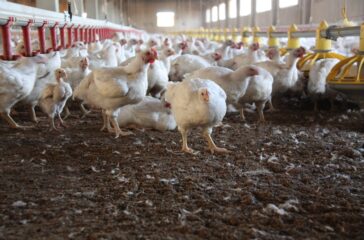Proposed factory farm ban divides California county
By Shannon Kelleher
When voters head to the polls on Tuesday to decide the next US president, residents of Sonoma County, California, will be asked to decide another contentious issue – they will be voting on a measure that would make their county the first in the nation to ban factory farms.
Measure J would prohibit farm operations that meet the US Environmental Protection Agency (EPA)’s definition of a concentrated animal feeding operation (CAFO), requiring them to either close or downsize within three years. The measure would also prevent new CAFOs from coming into the county.
Proponents say that CAFOs, where large numbers of animals are crowded together generating massive amounts of manure, are “major polluters” that pose a threat to wildlife and “vital watersheds” and present a “serious risk to public health” by providing a breeding ground for disease and creating other hazards. They cite one Sonoma County poultry operation with more than 500,000 birds as well as “documented criminal animal cruelty” at some CAFOs.
The measure appears to have only a slim chance of passing, facing staunch opposition from powerful farming organizations as well as business groups and even sustainability groups. But backers of the measure say their effort contributes to a groundswell of support for action against CAFOs.
In July, a state court in Michigan ruled that state regulators could take stronger actions to manage manure waste from CAFOs there, and in June 2023, Oregon passed a bill to tighten CAFO permitting to help mitigate water pollution. Calls for moratoriums on new CAFOs have been heard in recent years by legislatures in Iowa, Missouri, Minnesota, and Wisconsin.
“There’s been a lot of attempts, but there’s nothing yet that has been an actual vote among the people on prohibiting factory farms,” said Cassie King, an organizer with the activist group Direct Action Everywhere and the Yes on J campaign. “I think there’s a latent desire across the country to stop factory farming. This measure would provide not only a blueprint but also the inspiration that’s needed to kick more action into gear.”
Measure J is modeled on the Farm System Reform Act, said King, which was introduced in 2023 by US Sen. Cory Booker but has yet to move forward. The bill proposes phasing out CAFOs on a national level by 2041.
Measure J supporters state that only 21 of the more than 700 animal farms in the county would be affected if it passes.
But opponents, including the Sonoma County Farm Bureau, maintain the measure will have a number of negative ripple effects, including jeopardizing the existence of even small farming operations and reducing the availability of local meat, dairy and eggs.
 EWG
EWG